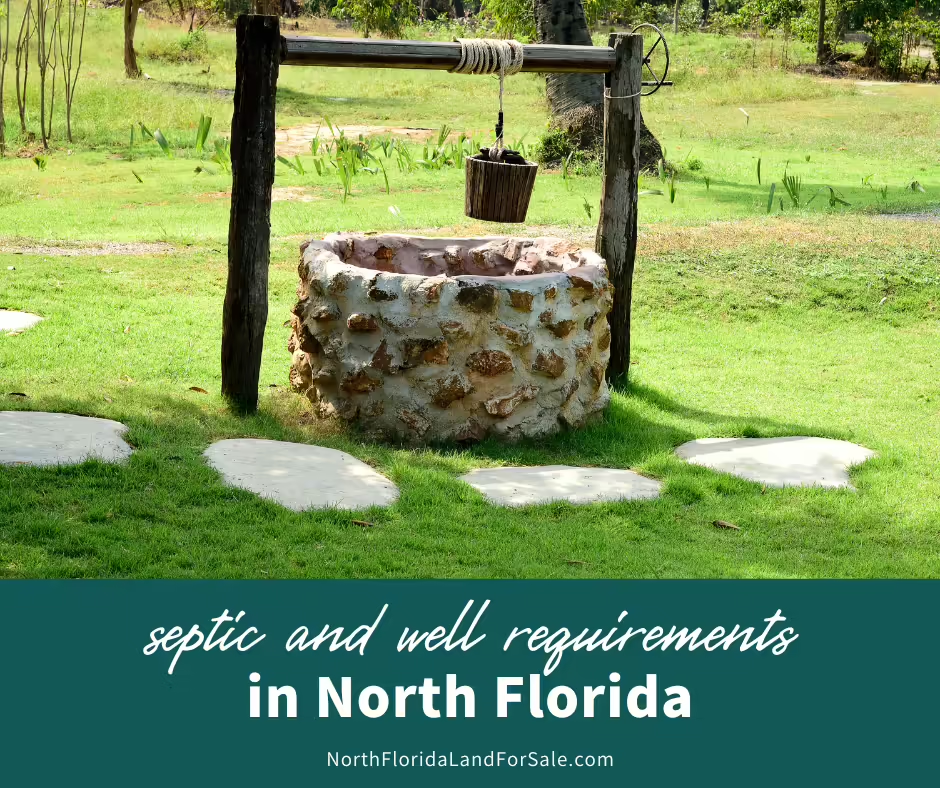
When purchasing land in North Florida, especially in rural areas, understanding septic and well requirements is crucial. Proper installation and maintenance of these systems are essential for environmental protection and public health. Here’s what you need to know:
Septic System Requirements
In Florida, the Department of Environmental Protection (DEP) oversees the regulation of onsite sewage treatment and disposal systems (OSTDS), commonly known as septic systems. The DEP’s Onsite Sewage Program provides guidelines and regulations to ensure these systems are properly installed and maintained.
Key considerations include:
- Permitting: Before installing a septic system, you must obtain a permit from the local county health department. The permitting process involves site evaluations to assess soil conditions, water table levels, and system design suitability. Learn more about permitting requirements.
- System Design: The design of the septic system must comply with state regulations, considering factors such as the number of bedrooms in a residence, soil permeability, and proximity to water bodies. Specific setback distances from wells, property lines, and surface waters are mandated to prevent contamination. Read more about septic system regulations.
- Maintenance: Regular maintenance is vital for system longevity and environmental safety. The Florida Department of Health recommends having your septic tank inspected and pumped every three to five years by a licensed contractor.
Well Water Requirements
Private wells are a common water source in North Florida’s rural areas. The Florida Department of Environmental Protection regulates water well construction to ensure safe drinking water and protect groundwater resources.
Important aspects include:
- Permitting and Construction: A permit is required to construct, repair, or abandon a well. Licensed water well contractors must adhere to construction standards outlined in Chapter 62-532 of the Florida Administrative Code.
- Setback Distances: Wells must be located at safe distances from potential contamination sources, including septic systems. The DEP specifies minimum setback distances to protect water quality.
- Water Testing: Regular testing of well water is crucial to ensure it meets safety standards. The Florida Department of Health provides resources and guidelines for private well testing.
Additional Considerations
- Local Regulations: While state guidelines provide a framework, local counties may have additional requirements or more stringent regulations. It’s essential to consult with local health departments or environmental agencies to ensure compliance.
- Professional Assistance: Engaging licensed professionals for the installation and maintenance of septic systems and wells is not only a regulatory requirement but also ensures the systems function correctly and safely.
Following these requirements will help you establish safe and compliant septic and well systems on your North Florida property.
Are You Buying a Home or Land for Sale in Lake City?
If you’re moving to Lake City, we can help you find the perfect place to live. Call us at 386-243-0124 to tell us what you want from your home and we will begin searching right away.
Check these out:
- Paved road frontage for sale in Columbia County
- Non-deed-restricted land for sale in Columbia County
- Wooded oak tree land for sale in Columbia County
- Land-for-land home combo in Lake City
- Waterfront residential in Lake City
- Waterfront land in Columbia County
- Bank-owned homes and foreclosure in Columbia County
- Short sales in Columbia County






